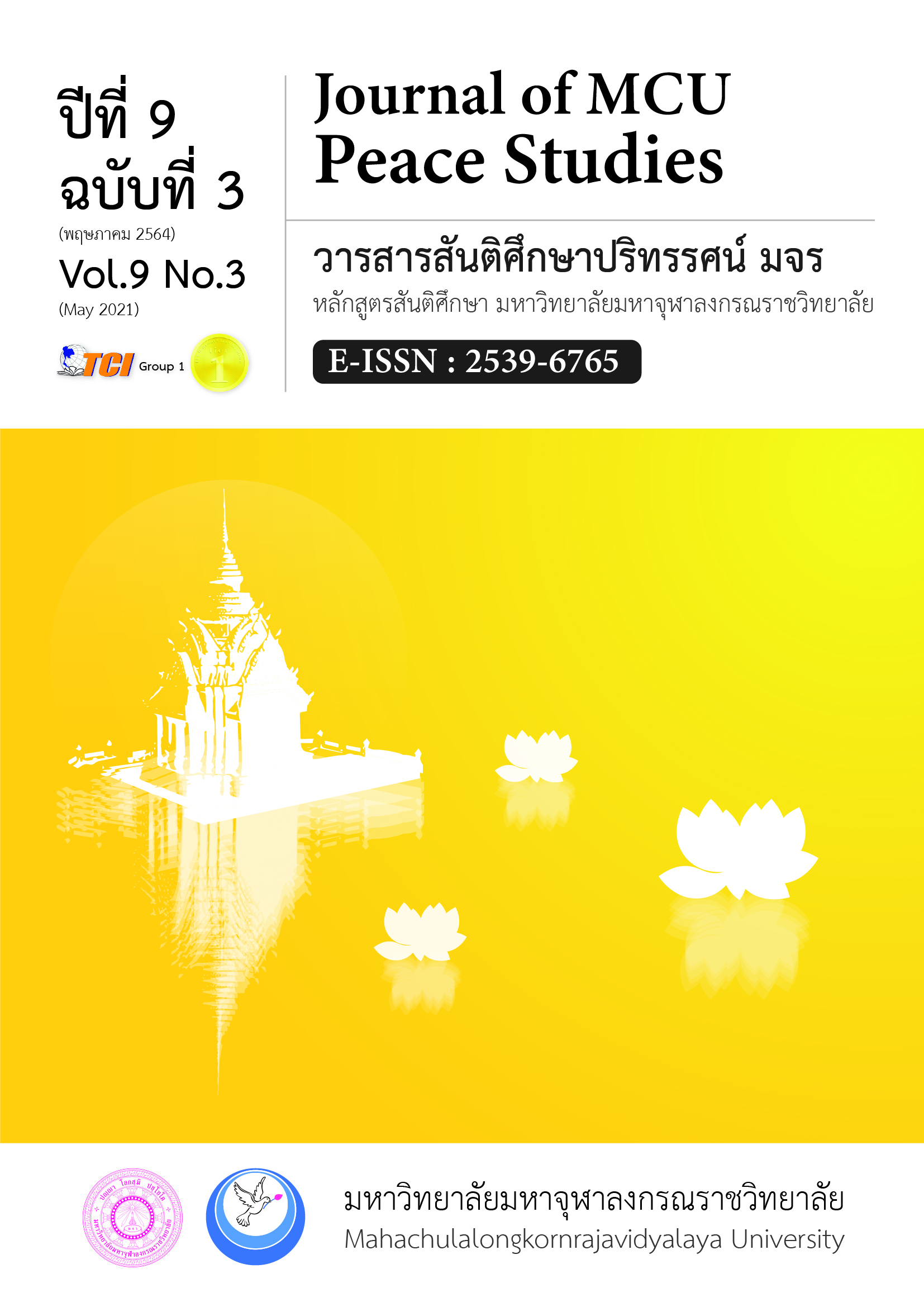แนวทางการจัดการศึกษาเพื่อพัฒนานักเรียนสู่โรงเรียนคุณธรรมตามหลักสติปัฏฐาน กรณีศึกษาโรงเรียนสาธิตมหาวิทยาลัยศรีนครินทรวิโรฒ ปทุมวัน
Main Article Content
บทคัดย่อ
บทความวิจัยนี้มีวัตถุประสงค์ 1) เพื่อศึกษาคุณลักษณะอันพึงประสงค์ของโรงเรียนคุณธรรมตามหลักสติปัฏฐาน และ 2) เพื่อเสนอแนวทางการจัดการเรียนการสอนโรงเรียนคุณธรรมตามหลักสติปัฏฐานเพื่อพัฒนานักเรียนสู่โรงเรียนคุณธรรมของโรงเรียนสาธิตมหาวิทยาลัยศรีนครินทรวิโรฒ ปทุมวัน โดยใช้ระเบียบวิธีการวิจัยแบบผสม คือ 1) สืบค้น วิเคราะห์หลักสติปัฏฐานข้อมูลปฐมภูมิ ศึกษาทฤษฎีการจัดการเรียนการสอนคุณธรรมจริยธรรม 2) กำหนดประชากรและการเลือกกลุ่มตัวอย่างคือนักเรียนโรงเรียนสาธิตมหาวิทยาลัย ศรีนครินทรวิโรฒ ปทุมวัน ชั้นมัธยมศึกษาปีที่ 3 จำนวน 415 คน กลุ่มตัวอย่างที่ใช้ในการวิจัย เป็นการเลือกแบบเจาะจง โดยการวิเคราะห์ข้อมูลใช้สถิติพื้นฐาน แล้วจึงนำผลการวิเคราะห์ข้อมูลที่ได้แล้วนำเสนอประกอบคำบรรยาย ผลการวิจัยพบว่า 1) คุณลักษณะอันพึงประสงค์ของโรงเรียนคุณธรรมตามหลักสติปัฏฐานมี 3 ด้าน ได้แก่ (1) “การมีสัมมาสติ” ของผู้เรียน คือ มีพฤติกรรมไม่หลงลืม มีสมาธิ (2) “การมีอัปปมาทธรรม” คือ ไม่ประมาท มีความรับผิดชอบ ตรงต่อเวลา และ (3) “การมีกระบวนพัฒนาปัญญาเพื่อการกำจัดอาสวกิเลส” คือ ผู้เรียนสามารถรักษาสภาพจิตใจของตนได้ สามารถแยกแยะสิ่งที่จำเป็นและไม่จำเป็น สามารถนำกระบวนการเรียนรู้ที่ได้เชื่อมโยงในมิติต่าง ๆ ได้ ขจัดพฤติกรรมที่ไม่พึงประสงค์ออกไป ทำให้เกิดพฤติกรรม ที่พึงประสงค์ในที่สุด และ 2) แนวทางการจัดการเรียนการสอนโรงเรียนคุณธรรมตามหลักสติปัฏฐานสอดคล้องกับกลุ่มทฤษฎีคอนสตรัคติวิสม์ในประเด็นที่ว่า ผู้เรียนลงมือกระทำและปฏิบัติด้วยตนเอง ผู้เรียนจะเปลี่ยนพฤติกรรมของตนเอง ผู้สอนเป็นเพียงผู้แนะนำ
Article Details
ทัศนะและความคิดเห็นที่ปรากฏในบทความในวารสาร ถือเป็นความรับผิดชอบของผู้เขียนบทความนั้น และไม่ถือเป็นทัศนะและความรับผิดชอบของกองบรรณาธิการ ยินยอมว่าบทความเป็นลิขสิทธิ์ของวารสาร
เอกสารอ้างอิง
BADA, S. Olusegun. (2015). Constructivism Learning Theory: A Paradigm for Teaching and Learning. IOSR Journal of Research & Method in Education (IOSR-JRME), (5)6, 66-70.
Bereiter, C. (1994). Constructivism, Socioculturalism, and Popper's World 3. Educational Researcher, 23(7), 21-23.
Bruner, J. S. (1961). The act of discovery. Harvard Educational Review, 31(1), 21-32.
Buddhadasa Bhikkhu. (2002). Moral for Teachers. Bangkok: Prasarnmitra Press.
Phra Buddhagosajarn. (P.A. Payutto). (1953). Samantapasathika Vinayatthakatha. (3rd ed.). Bangkok: Mahamakutrajjavittayalaya Press.
Department of Academic Affair. (1980). Guidance of Thai Ethical Development. Bangkok: Religious Press.
Department of Academic Affair. (1996). The Idea of Standard and Index of Basic Education: Product Factor and Process. Bangkok: Gurusapa Press.
Kohlberg, L. (1976). Moral Stages and Moralization: The Cognitive Developmental Approach, In T. Lickona (ed.). Moral development and hehavior: Theory, Research, andSocial Issues, New York: Holt, Rinehart & Winston.
Likert, R.A. (1932). Technique for the Measurement of Attitude. Chicago: Rand McNally Company.
Mahachulalongkornrajavittayalaya University. (1996). Thai Tipitakas. Bangkok: MCU Press.
Office of the Basic Education. (2014). The Guidance of Learning and Teaching: Civic Education. Bangkok: Office of the Basic Education Press.
Office of Nation Education Committee. (2001). Moral Measure and Evaluation of Learners. (2nd ed.). Bangkok: CU Press.
Office of the Education Council. (2017). Education Plan of Nation 2017-2036. (2nd ed.). Bangkok: Office of the Education Council.
P. A. Payutto. (1995). Dictionary of Buddhism. Bangkok: MCU Press.
_______. (1995). Buddhadhamma. Bangkok: MCU Press.
_______. (2016). Education: 30 Years Later. Bangkok: Sahadhammic Press.
Phramaha Adisorn Thirasilo. (1997). Morality for Teachers. Bangkok: O.S. Printing House.
Piaget, J. (1964). Cognitive Development in Children: Piaget Development and Learning. Part I, in Journal of Research in Science Teaching, 2, 176-186.
_______. (1971). The Theory of Stages in Cognitive Development. In D.R. Green (Ed.), Measurement and Piaget. New York: McGraw-Hill Press.
_______. (1980). The psychogenesis of knowledge and its epistemological significance. In M. Piatelli-Palmarini (Ed.), Language and learning (pp. 23-34). Cambridge, MA: Harvard University Press.
Prajanpajjanuk, P. (1985). Soiological Basic of Education. Bangkok: Behavioral Science Research Institute (BSRI), Prikwan graphic co. press.
Santichai-anan, A. (2006) . Education and Moral of High Education Students in Bangkok and Suburb. (Master’s Thesis). SWU. Bangkok.
Sinlarat, P. (1999). Knowledge and Moral. Bangkok: MCU Press.
Skinner, B. F. (1938). The Behavior of Organism: An Experimental Analysis. New York: AppletonCentury Crofts Inc. Press.
_______. (1993). About Behaviorism. London: Penguin. (Original Work published in 1974).
Sodmanee, O., & Janprasert, T. (2011) . Moral Development: From Idea to Practice. Warasan Phuettikammasat, 17(1), 19-30.
Vanintanon, N. (1991). Social Psychology.Bangkok: Behavioral Science Research Institute (BSRI).
Wattanachai, K. (2015). Handbook of Moral School. (5th ed.). Bangkok: Sahamitra Press.
_______. (2016). Moral School: Construct Moral Man for Society. (8th ed.). Bangkok: Thanathat Press.
_______. (2016). Beloved Teachers: Good to be Teacher. (9th ed.). Bangkok: Thanathat Press.
_______. (2016). 6 Stems to Moral School. Bangkok: Thanathat Press.
Yanaponikathera. (1995). The Heart of Buddhist Meditation. (Suwannavibat, C. Translator) (4th ed.). Bangkok: Pimsiam Press.


